Unit 6 When was it invented? Section A(Grammar focus-4c)课件(共31张PPT)2023-2024学年人教版英语九年级全册
文档属性
| 名称 | Unit 6 When was it invented? Section A(Grammar focus-4c)课件(共31张PPT)2023-2024学年人教版英语九年级全册 | 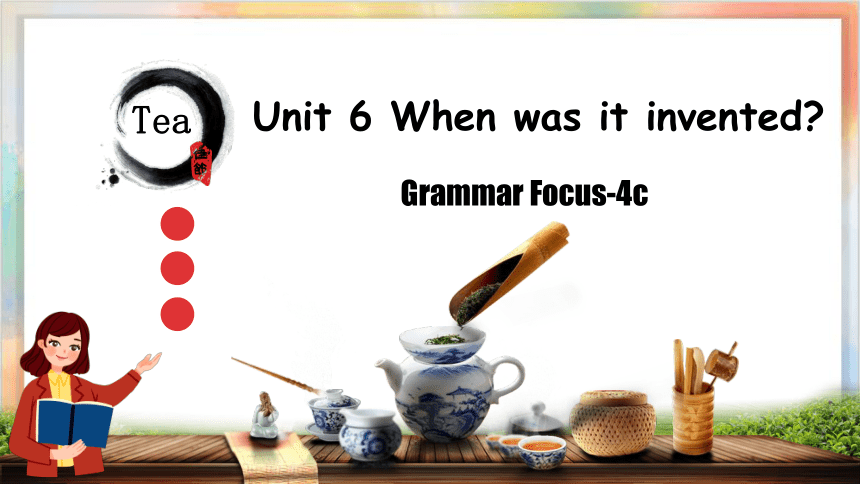 | |
| 格式 | pptx | ||
| 文件大小 | 19.6MB | ||
| 资源类型 | 教案 | ||
| 版本资源 | 人教新目标(Go for it)版 | ||
| 科目 | 英语 | ||
| 更新时间 | 2023-11-05 20:51:18 | ||
图片预览

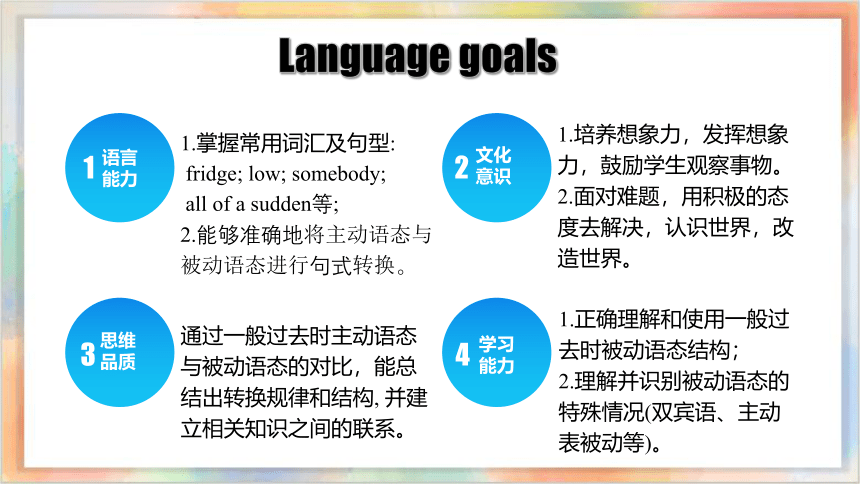
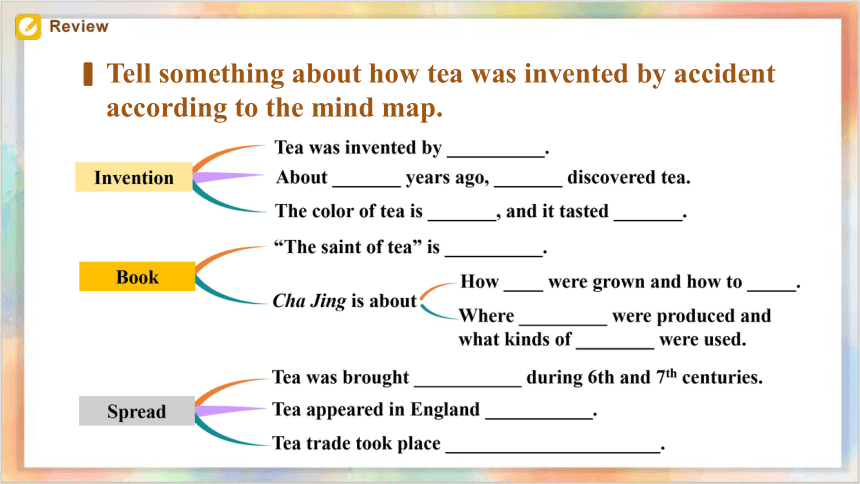

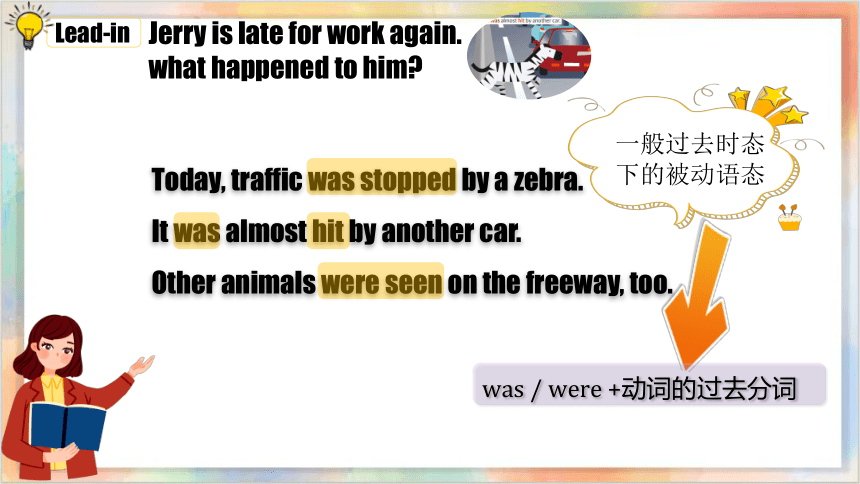
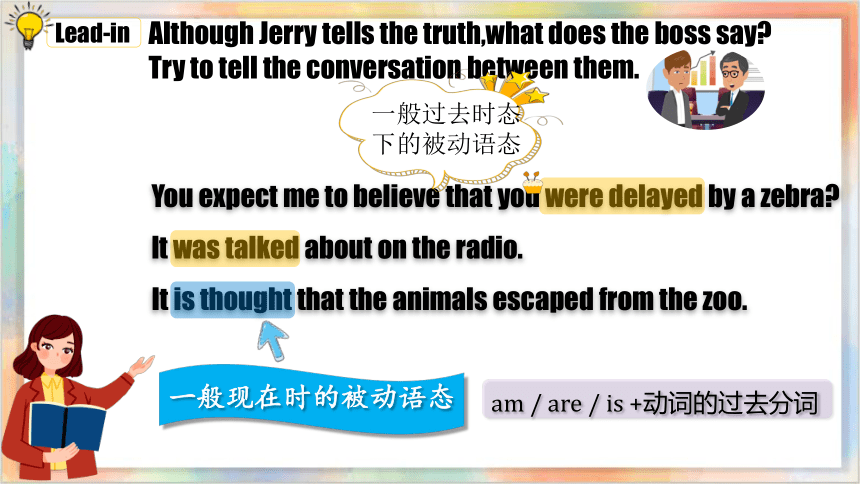
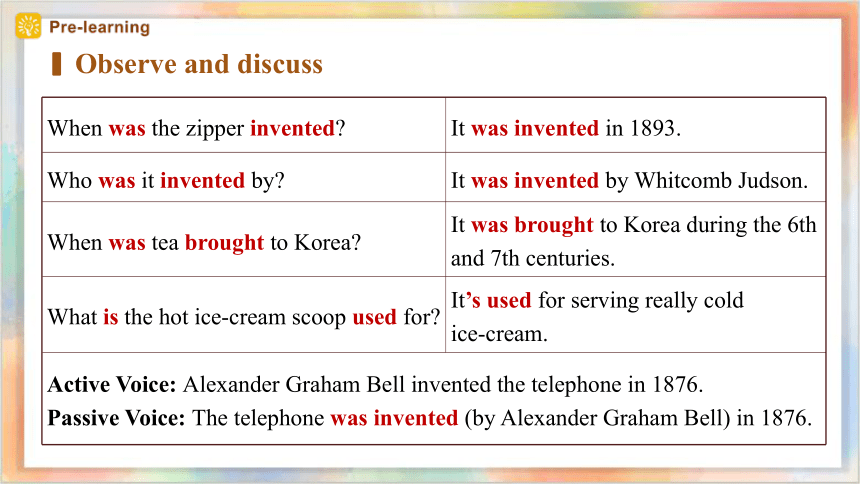
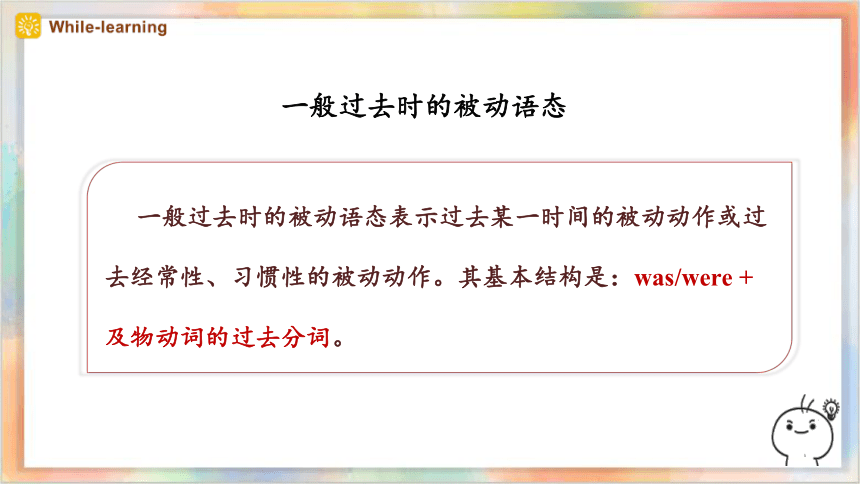
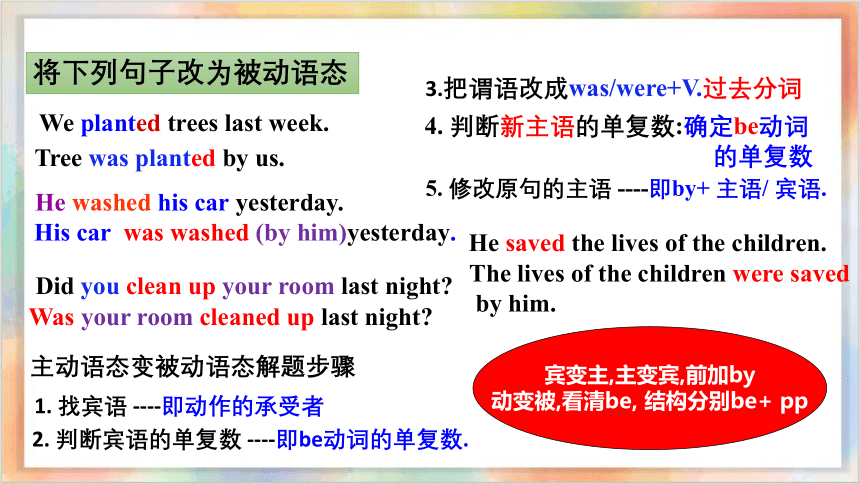
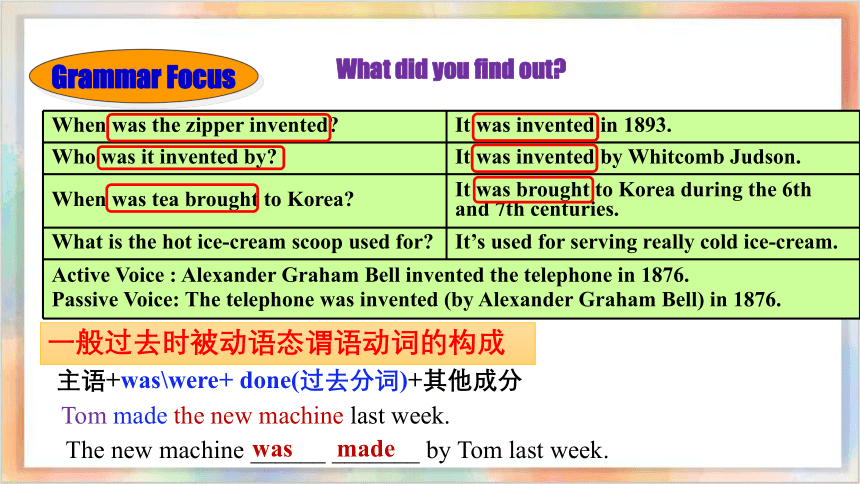
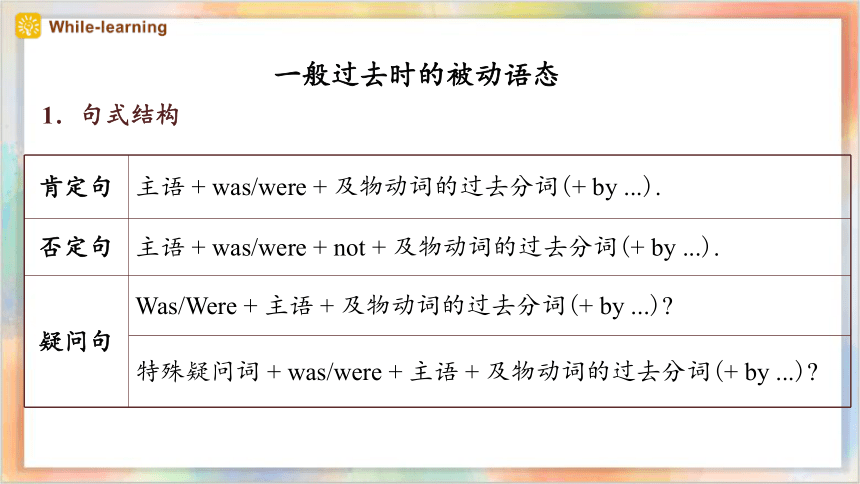
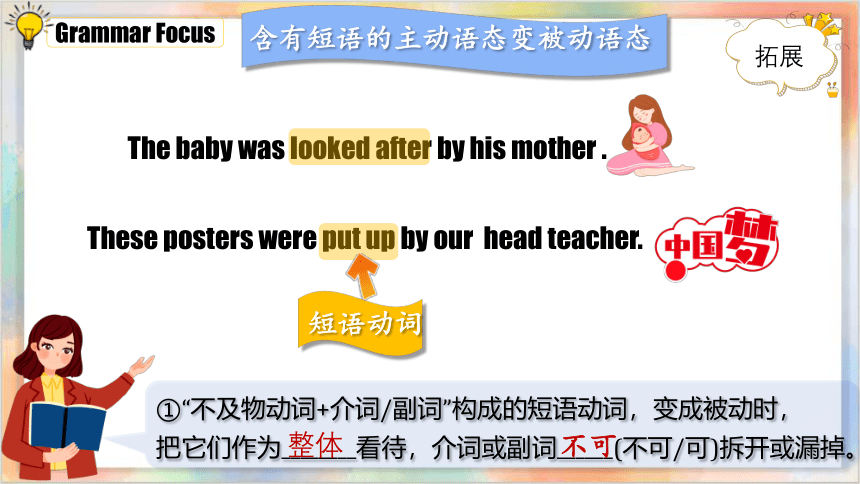
文档简介
(共31张PPT)
Tea
Unit 6 When was it invented
Grammar Focus-4c
Language goals
语言
能力
学习
能力
思维
品质
文化
意识
1.培养想象力,发挥想象力,鼓励学生观察事物。
2.面对难题,用积极的态度去解决,认识世界,改造世界。
1.掌握常用词汇及句型:
fridge; low; somebody;
all of a sudden等;
2.能够准确地将主动语态与
被动语态进行句式转换。
通过一般过去时主动语态与被动语态的对比,能总结出转换规律和结构, 并建立相关知识之间的联系。
1.正确理解和使用一般过去时被动语态结构;
2.理解并识别被动语态的特殊情况(双宾语、主动表被动等)。
1
2
3
4
Tell something about how tea was invented by accident according to the mind map.
New words
fridge
low
somebody
translate
lock
ring
earthquake
sudden
all of a sudden
bell
biscuit
cookie
musical
instrument
n. 冰箱
adj. 低的;矮的
pron. 某人 n. 重要人物
v. 翻译
v. 锁上;锁住 n. 锁
v. (rang, rung) 发出钟声或铃声;打电话
n. 地震
adj. 突然(的)
突然;猛地
n. 钟(声);铃(声)
n. 饼干
n.曲奇饼
adj. 音乐的;有音乐天赋的
n. 器械;仪器;工具
Today, traffic was stopped by a zebra.
It was almost hit by another car.
Other animals were seen on the freeway, too.
Lead-in
Jerry is late for work again.
what happened to him
一般过去时态下的被动语态
was / were +动词的过去分词
You expect me to believe that you were delayed by a zebra
lt was talked about on the radio.
It is thought that the animals escaped from the zoo.
Lead-in
Although Jerry tells the truth,what does the boss say
Try to tell the conversation between them.
一般过去时态下的被动语态
一般现在时的被动语态
am / are / is +动词的过去分词
Observe and discuss
When was the zipper invented It was invented in 1893.
Who was it invented by It was invented by Whitcomb Judson.
When was tea brought to Korea It was brought to Korea during the 6th and 7th centuries.
What is the hot ice-cream scoop used for It’s used for serving really cold
ice-cream.
Active Voice: Alexander Graham Bell invented the telephone in 1876. Passive Voice: The telephone was invented (by Alexander Graham Bell) in 1876.
一般过去时的被动语态
一般过去时的被动语态表示过去某一时间的被动动作或过去经常性、习惯性的被动动作。其基本结构是:was/were +及物动词的过去分词。
将下列句子改为被动语态
We planted trees last week.
主动语态变被动语态解题步骤
1. 找宾语 ----即动作的承受者
2. 判断宾语的单复数 ----即be动词的单复数.
3.把谓语改成was/were+V.过去分词
5. 修改原句的主语 ----即by+ 主语/ 宾语.
宾变主,主变宾,前加by
动变被,看清be, 结构分别be+ pp
Tree was planted by us.
4. 判断新主语的单复数:确定be动词
的单复数
He washed his car yesterday.
His car was washed (by him)yesterday.
Did you clean up your room last night
Was your room cleaned up last night
He saved the lives of the children.
The lives of the children were saved
by him.
Grammar Focus
When was the zipper invented It was invented in 1893.
Who was it invented by It was invented by Whitcomb Judson.
When was tea brought to Korea It was brought to Korea during the 6th and 7th centuries.
What is the hot ice-cream scoop used for It’s used for serving really cold ice-cream.
Active Voice : Alexander Graham Bell invented the telephone in 1876. Passive Voice: The telephone was invented (by Alexander Graham Bell) in 1876.
一般过去时被动语态谓语动词的构成
主语+was\were+ done(过去分词)+其他成分
Tom made the new machine last week.
The new machine ______ _______ by Tom last week.
was made
What did you find out
一般过去时的被动语态
1.句式结构
肯定句 主语 + was/were + 及物动词的过去分词(+ by ...).
否定句 主语 + was/were + not + 及物动词的过去分词(+ by ...).
疑问句 Was/Were + 主语 + 及物动词的过去分词(+ by ...)
特殊疑问词 + was/were + 主语 + 及物动词的过去分词(+ by ...)
The baby was looked after by his mother .
Grammar Focus
①“不及物动词+介词/副词”构成的短语动词,变成被动时,
把它们作为________看待,介词或副词______(不可/可)拆开或漏掉。
整体
不可
含有短语的主动语态变被动语态
These posters were put up by our head teacher.
短语动词
拓展
一般过去时的被动语态
2.基本用法
用法 示例
表示过去某一具体时间发生的动作,且句子的主语是谓语动词动作的承受者。 The trees were planted last year.
这些树是去年种的。
讲述发生在过去的动作,且不知道动作的执行者。 He was given a robot as a birthday gift last year. 去年他收到了一个机器人作为生日礼物。
一般过去时的被动语态
3.含双宾语和复合宾语的主动句变为被动句的方法
(1)含有双宾语的主动句变为被动句时,通常把指 “人”的间
接宾语变为主语,而指“物”的直接宾语则不变。
e.g. He gave me some advice on learning English.
I was given some advice on learning English (by him).
(2)如果要把指“物”的直接宾语变为主语,则在间接宾语前加
to 或 for。
e.g. My mother brought me a bike.
A bike was brought to me (by my mother).
含有双宾语的主动语态变被动语态
Tom gave me a book yesterday.
I was given a book by Tom.
A book was given to me by Tom.
当指“人”的间接宾语变为主语,指“物”的直接宾语保留不变;如果把指“物”的直接宾语变为主语,则在间接语前加to或for
直接宾语做主语
间接宾语做主语
口诀:如遇双宾语,一般变间宾,若把直宾变,to /for 间宾连。
I saw a heavy man enter the house.
主动句中感官动词see / hear / watch / feel等和使役动词make / let / have等后跟省略to的动词不定式,变为被动语态时应加上不定式标志to。
感官动词和使役动词的被动语态
口诀:
感使动词真叫怪,to来to去记心怀,主动语态to离去,被动语态to回来。
A heavy man was seen to enter the house.
一般过去时的被动语态
3.含双宾语和复合宾语的主动句变为被动句的方法
(3)含有复合宾语的主动句变为被动句时,要将其中的宾语变成
主语,宾语补足语不变。
e.g. Jim asked Tom to finish the work at once.
Tom was asked (by Jim) to finish the work at once.
(4)如果宾语补足语是不带 to 的动词不定式,主动语态变成被动语态
时要加上不定式符号 to。
e.g. We often saw John play basketball in the playground.
John was often seen to play basketball in the playground (by us).
Mom bought me a new coat.
Grammar Focus
②当指“人”的间接宾语变为主语,指“物”的直接宾语保留不变;
如果把指“物”的直接宾语变为主语,则在指“人”的间接语前加_______.
to/for
含有双宾语的主动语态变被动语态
A new coat was bought for me. (直接接宾语作主语)
间接宾语
拓展
I was bought a new coat. (间接宾语作主语)
直接宾语
Tom gave me a book yesterday.
I was given a book by Tom. (间接宾语做主语)
A book was given to me by Tom. (直接宾语做主语)
Let’s challenge:
直接宾语
间接宾语
→Some advice was given to the pupils by the teacher.
1. The teacher gave the pupils some advice.
→The pupils were given some advice by the teacher.
2. The teacher told us to read more.
省略to的不定式作宾补
→We were told to read more by the teacher.
3. The boss made them work 12 hours a day.
→They are made to work 12 hours a day.
不定式作宾语补足语
举一反三:
show/give/offer/send /bring/ lend /teach/buy
举一反三:tell/ask/ help/advise/warn/allow/invite
举一反三:
make/have/watch/see/let/hear/feel
Rewrite the sentences using the passive voice.
一般过去时的被动语态
e.g. My grandma took good care of my dog.
→My dog was taken good care of by my grandma.
奶奶把我的狗照顾得很好。(其中介词 of 不能漏掉)
含有动词短语的主动语态变为被动语态时,不可丢掉构成动词短语的介词或副词。
注意
Paper ______ first ______ about 2,000 years ago in China.
A.is; creating B.is; created
C.has; created D.was; created
可用语法判断法解答本题。句意:在中国,纸大约在两千年前首先被创造了出来。句中的 ago 是一般过去时的标志,且纸和创造之间是被动关系。因此本题考查的是一般过去时的被动语态,其结构是:was/were + 及物动词的过去分词。因此,正确答案是D。
D
典例
点拨
一般过去时的被动语态
肯定句 主语+am/is/are+过去分词( + by…)
Eg. This meal was made by Tom.
否定句 主语+am/is/are + not +过去分词 (+by…)
Eg. This meal was not made by Tom.
疑问句 Am/Is/Are+主语+过去分词(+ by …)
Eg. Was this meal made by Tom
特殊疑问词+ am/is/are+主语+过去分词(+ by ...)
Eg. What was made by Tom
一般过去时被动语态的结构
was/were
was/were
Was/Were
was/were
1.He saw the girl play soccer every day.(改为被动语态)
→The girl play soccer every day (by him).
2.His friend bought him a dictionary.(改为被动语态)
→He a dictionary (by his friend).(间接宾语做主语)
→A dictionary him (by his friend).(直接宾语做主语)
4.Our parents advised us not to go out alone.(改为被动语态)
→We alone (by our parents).
Let’s try:
was seen to
was bought
was bought for
were advised not to go out
Rewrite the sentences using the passive voice.
1. They sold the fridge at a low price.
_______________________________________________________________
2. Somebody stole my camera from my hotel room.
________________________________________________________________
3. Where did you take these photos
________________________________________________________________
4. Our parents advised us not to go out alone.
_________________________________________________________________
5. Different writers translated the book into different languages.
___________________________________________________________________
The fridge was sold at a low price.
4a
Presentation
n.某人
Where were these photos taken
We were advised by our parents not to go out alone.
The book was translated into different languages by different writers.
My camera was stolen from my hotel room.
n.冰箱
adj.
低的
eat lock like ring invite break tell bring
You _____________ to the party last night, weren’t you Why didn’t you go
2. The earthquake happened all of a sudden, but luckily the villagers _____________ to a safe place.
were invited
were brought
3. The door ___________ when we arrived, so we ______ the bell.
4. The students ________ not to eat or drink in class. But Ruby _______ the rule when she started eating a biscuit in science class.
5. The cookies _________ by the hungry kids in less than 20 minutes, and they really _____ them.
was locked
rang
were told
broke
were eaten
liked
注意be动词和时态
4b
Complete the sentences with the correct forms of the verbs in the box.
Decide whether active or passive forms should be used in these sentences. Write the correct forms in the blanks.
4c
The telephone _____________(invent) by Alexander Graham Bell. He __________ (born) in 1847. Mr. Bell ________ (work) on the invention of the telephone with Thomas Watson. In 1875, Mr. Bell ________ (learn) how to send musical notes through an instrument similar to a telephone. Finally, the telephone ____________ (invent) in 1876. The first sentence that _________ (say) on the telephone by Mr. Bell was “Mr. Watson, come here; I want to see you.” Today the telephone ________ (use) around the world.
was invented
was born
worked
learned
was invented
is used
was said
Inventions have changed our life.They make the world smaller and smaller and make our life more and more convenience.
Group work
Can you tell some modern inventions
around us
You can speak like this:
When was ... invented
Who was ... invented by
What was ... used for
Now,it is used......
单项选择。
1. — Today Chinese is becoming more and more
popular.
— It _______ in many schools around the world.
A. teaches B. is teaching
C. has taught D. is taught
D
Exercises
2. We _______ to close the windows before we left the lab.
A. tell B. told C. are told D. were told
3. — Did you hear that water in Tai Lake smelt terrible
— Yes. In fact, it _______. That's all because of the
people and the factories around.
A. polluted B. was polluted
C. has polluted D. will pollute
D
B
一般过去时
的被动语态
was/were + 及物动词的过去分词
·表示过去某一具体时间发生的动作,且句子
的主语是谓语动词动作的承受者。
·讲述发生在过去的动作,且不知道动作的执
行者。
1.基本结构
2.基本用法
3.含双宾语和复合宾语的主动句变为被动句的方法
1.Read the passage in 4c and retell the story in your
own words.
2.Look for an invention that you are interested in and
read books about it. Then share it with the class.
Tea
Unit 6 When was it invented
Grammar Focus-4c
Language goals
语言
能力
学习
能力
思维
品质
文化
意识
1.培养想象力,发挥想象力,鼓励学生观察事物。
2.面对难题,用积极的态度去解决,认识世界,改造世界。
1.掌握常用词汇及句型:
fridge; low; somebody;
all of a sudden等;
2.能够准确地将主动语态与
被动语态进行句式转换。
通过一般过去时主动语态与被动语态的对比,能总结出转换规律和结构, 并建立相关知识之间的联系。
1.正确理解和使用一般过去时被动语态结构;
2.理解并识别被动语态的特殊情况(双宾语、主动表被动等)。
1
2
3
4
Tell something about how tea was invented by accident according to the mind map.
New words
fridge
low
somebody
translate
lock
ring
earthquake
sudden
all of a sudden
bell
biscuit
cookie
musical
instrument
n. 冰箱
adj. 低的;矮的
pron. 某人 n. 重要人物
v. 翻译
v. 锁上;锁住 n. 锁
v. (rang, rung) 发出钟声或铃声;打电话
n. 地震
adj. 突然(的)
突然;猛地
n. 钟(声);铃(声)
n. 饼干
n.曲奇饼
adj. 音乐的;有音乐天赋的
n. 器械;仪器;工具
Today, traffic was stopped by a zebra.
It was almost hit by another car.
Other animals were seen on the freeway, too.
Lead-in
Jerry is late for work again.
what happened to him
一般过去时态下的被动语态
was / were +动词的过去分词
You expect me to believe that you were delayed by a zebra
lt was talked about on the radio.
It is thought that the animals escaped from the zoo.
Lead-in
Although Jerry tells the truth,what does the boss say
Try to tell the conversation between them.
一般过去时态下的被动语态
一般现在时的被动语态
am / are / is +动词的过去分词
Observe and discuss
When was the zipper invented It was invented in 1893.
Who was it invented by It was invented by Whitcomb Judson.
When was tea brought to Korea It was brought to Korea during the 6th and 7th centuries.
What is the hot ice-cream scoop used for It’s used for serving really cold
ice-cream.
Active Voice: Alexander Graham Bell invented the telephone in 1876. Passive Voice: The telephone was invented (by Alexander Graham Bell) in 1876.
一般过去时的被动语态
一般过去时的被动语态表示过去某一时间的被动动作或过去经常性、习惯性的被动动作。其基本结构是:was/were +及物动词的过去分词。
将下列句子改为被动语态
We planted trees last week.
主动语态变被动语态解题步骤
1. 找宾语 ----即动作的承受者
2. 判断宾语的单复数 ----即be动词的单复数.
3.把谓语改成was/were+V.过去分词
5. 修改原句的主语 ----即by+ 主语/ 宾语.
宾变主,主变宾,前加by
动变被,看清be, 结构分别be+ pp
Tree was planted by us.
4. 判断新主语的单复数:确定be动词
的单复数
He washed his car yesterday.
His car was washed (by him)yesterday.
Did you clean up your room last night
Was your room cleaned up last night
He saved the lives of the children.
The lives of the children were saved
by him.
Grammar Focus
When was the zipper invented It was invented in 1893.
Who was it invented by It was invented by Whitcomb Judson.
When was tea brought to Korea It was brought to Korea during the 6th and 7th centuries.
What is the hot ice-cream scoop used for It’s used for serving really cold ice-cream.
Active Voice : Alexander Graham Bell invented the telephone in 1876. Passive Voice: The telephone was invented (by Alexander Graham Bell) in 1876.
一般过去时被动语态谓语动词的构成
主语+was\were+ done(过去分词)+其他成分
Tom made the new machine last week.
The new machine ______ _______ by Tom last week.
was made
What did you find out
一般过去时的被动语态
1.句式结构
肯定句 主语 + was/were + 及物动词的过去分词(+ by ...).
否定句 主语 + was/were + not + 及物动词的过去分词(+ by ...).
疑问句 Was/Were + 主语 + 及物动词的过去分词(+ by ...)
特殊疑问词 + was/were + 主语 + 及物动词的过去分词(+ by ...)
The baby was looked after by his mother .
Grammar Focus
①“不及物动词+介词/副词”构成的短语动词,变成被动时,
把它们作为________看待,介词或副词______(不可/可)拆开或漏掉。
整体
不可
含有短语的主动语态变被动语态
These posters were put up by our head teacher.
短语动词
拓展
一般过去时的被动语态
2.基本用法
用法 示例
表示过去某一具体时间发生的动作,且句子的主语是谓语动词动作的承受者。 The trees were planted last year.
这些树是去年种的。
讲述发生在过去的动作,且不知道动作的执行者。 He was given a robot as a birthday gift last year. 去年他收到了一个机器人作为生日礼物。
一般过去时的被动语态
3.含双宾语和复合宾语的主动句变为被动句的方法
(1)含有双宾语的主动句变为被动句时,通常把指 “人”的间
接宾语变为主语,而指“物”的直接宾语则不变。
e.g. He gave me some advice on learning English.
I was given some advice on learning English (by him).
(2)如果要把指“物”的直接宾语变为主语,则在间接宾语前加
to 或 for。
e.g. My mother brought me a bike.
A bike was brought to me (by my mother).
含有双宾语的主动语态变被动语态
Tom gave me a book yesterday.
I was given a book by Tom.
A book was given to me by Tom.
当指“人”的间接宾语变为主语,指“物”的直接宾语保留不变;如果把指“物”的直接宾语变为主语,则在间接语前加to或for
直接宾语做主语
间接宾语做主语
口诀:如遇双宾语,一般变间宾,若把直宾变,to /for 间宾连。
I saw a heavy man enter the house.
主动句中感官动词see / hear / watch / feel等和使役动词make / let / have等后跟省略to的动词不定式,变为被动语态时应加上不定式标志to。
感官动词和使役动词的被动语态
口诀:
感使动词真叫怪,to来to去记心怀,主动语态to离去,被动语态to回来。
A heavy man was seen to enter the house.
一般过去时的被动语态
3.含双宾语和复合宾语的主动句变为被动句的方法
(3)含有复合宾语的主动句变为被动句时,要将其中的宾语变成
主语,宾语补足语不变。
e.g. Jim asked Tom to finish the work at once.
Tom was asked (by Jim) to finish the work at once.
(4)如果宾语补足语是不带 to 的动词不定式,主动语态变成被动语态
时要加上不定式符号 to。
e.g. We often saw John play basketball in the playground.
John was often seen to play basketball in the playground (by us).
Mom bought me a new coat.
Grammar Focus
②当指“人”的间接宾语变为主语,指“物”的直接宾语保留不变;
如果把指“物”的直接宾语变为主语,则在指“人”的间接语前加_______.
to/for
含有双宾语的主动语态变被动语态
A new coat was bought for me. (直接接宾语作主语)
间接宾语
拓展
I was bought a new coat. (间接宾语作主语)
直接宾语
Tom gave me a book yesterday.
I was given a book by Tom. (间接宾语做主语)
A book was given to me by Tom. (直接宾语做主语)
Let’s challenge:
直接宾语
间接宾语
→Some advice was given to the pupils by the teacher.
1. The teacher gave the pupils some advice.
→The pupils were given some advice by the teacher.
2. The teacher told us to read more.
省略to的不定式作宾补
→We were told to read more by the teacher.
3. The boss made them work 12 hours a day.
→They are made to work 12 hours a day.
不定式作宾语补足语
举一反三:
show/give/offer/send /bring/ lend /teach/buy
举一反三:tell/ask/ help/advise/warn/allow/invite
举一反三:
make/have/watch/see/let/hear/feel
Rewrite the sentences using the passive voice.
一般过去时的被动语态
e.g. My grandma took good care of my dog.
→My dog was taken good care of by my grandma.
奶奶把我的狗照顾得很好。(其中介词 of 不能漏掉)
含有动词短语的主动语态变为被动语态时,不可丢掉构成动词短语的介词或副词。
注意
Paper ______ first ______ about 2,000 years ago in China.
A.is; creating B.is; created
C.has; created D.was; created
可用语法判断法解答本题。句意:在中国,纸大约在两千年前首先被创造了出来。句中的 ago 是一般过去时的标志,且纸和创造之间是被动关系。因此本题考查的是一般过去时的被动语态,其结构是:was/were + 及物动词的过去分词。因此,正确答案是D。
D
典例
点拨
一般过去时的被动语态
肯定句 主语+am/is/are+过去分词( + by…)
Eg. This meal was made by Tom.
否定句 主语+am/is/are + not +过去分词 (+by…)
Eg. This meal was not made by Tom.
疑问句 Am/Is/Are+主语+过去分词(+ by …)
Eg. Was this meal made by Tom
特殊疑问词+ am/is/are+主语+过去分词(+ by ...)
Eg. What was made by Tom
一般过去时被动语态的结构
was/were
was/were
Was/Were
was/were
1.He saw the girl play soccer every day.(改为被动语态)
→The girl play soccer every day (by him).
2.His friend bought him a dictionary.(改为被动语态)
→He a dictionary (by his friend).(间接宾语做主语)
→A dictionary him (by his friend).(直接宾语做主语)
4.Our parents advised us not to go out alone.(改为被动语态)
→We alone (by our parents).
Let’s try:
was seen to
was bought
was bought for
were advised not to go out
Rewrite the sentences using the passive voice.
1. They sold the fridge at a low price.
_______________________________________________________________
2. Somebody stole my camera from my hotel room.
________________________________________________________________
3. Where did you take these photos
________________________________________________________________
4. Our parents advised us not to go out alone.
_________________________________________________________________
5. Different writers translated the book into different languages.
___________________________________________________________________
The fridge was sold at a low price.
4a
Presentation
n.某人
Where were these photos taken
We were advised by our parents not to go out alone.
The book was translated into different languages by different writers.
My camera was stolen from my hotel room.
n.冰箱
adj.
低的
eat lock like ring invite break tell bring
You _____________ to the party last night, weren’t you Why didn’t you go
2. The earthquake happened all of a sudden, but luckily the villagers _____________ to a safe place.
were invited
were brought
3. The door ___________ when we arrived, so we ______ the bell.
4. The students ________ not to eat or drink in class. But Ruby _______ the rule when she started eating a biscuit in science class.
5. The cookies _________ by the hungry kids in less than 20 minutes, and they really _____ them.
was locked
rang
were told
broke
were eaten
liked
注意be动词和时态
4b
Complete the sentences with the correct forms of the verbs in the box.
Decide whether active or passive forms should be used in these sentences. Write the correct forms in the blanks.
4c
The telephone _____________(invent) by Alexander Graham Bell. He __________ (born) in 1847. Mr. Bell ________ (work) on the invention of the telephone with Thomas Watson. In 1875, Mr. Bell ________ (learn) how to send musical notes through an instrument similar to a telephone. Finally, the telephone ____________ (invent) in 1876. The first sentence that _________ (say) on the telephone by Mr. Bell was “Mr. Watson, come here; I want to see you.” Today the telephone ________ (use) around the world.
was invented
was born
worked
learned
was invented
is used
was said
Inventions have changed our life.They make the world smaller and smaller and make our life more and more convenience.
Group work
Can you tell some modern inventions
around us
You can speak like this:
When was ... invented
Who was ... invented by
What was ... used for
Now,it is used......
单项选择。
1. — Today Chinese is becoming more and more
popular.
— It _______ in many schools around the world.
A. teaches B. is teaching
C. has taught D. is taught
D
Exercises
2. We _______ to close the windows before we left the lab.
A. tell B. told C. are told D. were told
3. — Did you hear that water in Tai Lake smelt terrible
— Yes. In fact, it _______. That's all because of the
people and the factories around.
A. polluted B. was polluted
C. has polluted D. will pollute
D
B
一般过去时
的被动语态
was/were + 及物动词的过去分词
·表示过去某一具体时间发生的动作,且句子
的主语是谓语动词动作的承受者。
·讲述发生在过去的动作,且不知道动作的执
行者。
1.基本结构
2.基本用法
3.含双宾语和复合宾语的主动句变为被动句的方法
1.Read the passage in 4c and retell the story in your
own words.
2.Look for an invention that you are interested in and
read books about it. Then share it with the class.
同课章节目录
- Unit 1 How can we become good learners.
- Section A
- Section B
- Unit 2 I think that mooncakes are delicious!
- Section A
- Section B
- Unit 3 Could you please tell me where the restroom
- Section A
- Section B
- Unit 4 I used to be afraid of the dark.
- Section A
- Section B
- Unit 5 What are the shirts made of?
- Section A
- Section B
- Review of Units 1-5
- Unit 6 When was it invented?
- Section A
- Section B
- Unit 7 Teenagers should be allowed to choose their
- Section A
- Section B
- Unit 8 It must belong to Carla.
- Section A
- Section B
- Unit 9 I like music that I can dance to.
- Section A
- Section B
- Unit 10 You're supposed to shake hands.
- Section A
- Section B
- Review of Units 6-10
- Unit 11 Sad movies make me cry.
- Section A
- Section B
- Unit 12 Life is full of the unexpected
- Section A
- Section B
- Unit 13 We're trying to save the earth!
- Section A
- Section B
- Unit 14 I remember meeting all of you in Grade 7.
- Section A
- Section B
- Review of Units 11-14
